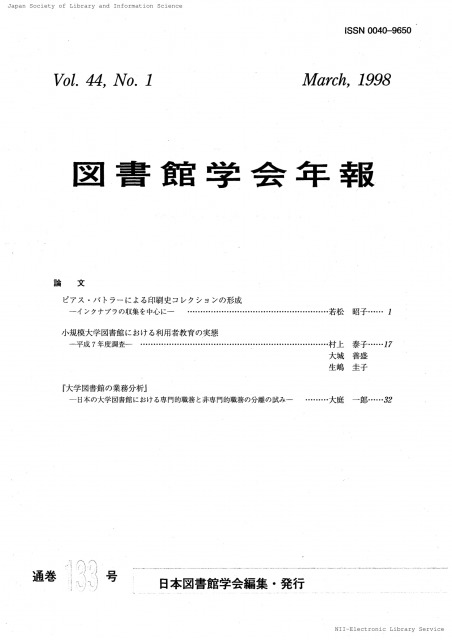All issues

Volume 40 (1994)
- Issue 4 Pages 133-
- Issue 3 Pages 97-
- Issue 2 Pages 49-
- Issue 1 Pages 1-
Volume 40, Issue 4
Displaying 1-6 of 6 articles from this issue
- |<
- <
- 1
- >
- >|
Article
-
Zensei OSHIRO, Keiko IKUSHIMA, Yasuko MURAKAMIArticle type: Article
1994Volume 40Issue 4 Pages 133-144
Published: 1994
Released on J-STAGE: November 10, 2021
JOURNAL FREE ACCESSThis reports the results of a survey of the formal user education given at seventy-one large academic libraries in Japan. Being divided into two areas: ‘orientation' and ‘other than orientation'; the questionnaire asked about the contents, methods, sizes, etc. of user education. It also asked whether or not the orientation was planned as a part of university orientation.
It was found that forty out of seventy one libraries planned their own orientation independent of their parent organizations', and that fifty three libraries set up programs for user education other than orientation. The survey results were much better than the authors expected. However, there were many areas to be improved, compared with user education in the U. S. academic libraries.View full abstractDownload PDF (1291K) -
Akira NEMOTOArticle type: Article
1994Volume 40Issue 4 Pages 145-159
Published: 1994
Released on J-STAGE: November 10, 2021
JOURNAL FREE ACCESSJ. H.Shera (1903-1982) left us an essay about the methodological foundation of study in librarianship just before his death. This was to deny his own idea, which was popular 1960s through 1980s among librarians, that information science should be the foundation of study of librarianship and both should fuse into one discipline. He argued the study of librarianship should go on with humanities and social science, and especially emphasized the importance of symbolic interactionism, a theory of sociology.
This article discusses the background of his change of mind by examining 1) his attitude toward information science, 2) his professional interest in education for librarianship, especially the role of the Graduate Library School, University of Chicago, 3) his academic background and his humanistic research history, 4) influence of criticism of science which attacked all the academic disciplines through early 1970s.
Then the trends of research in librarianship after him are examined. While positivistic trends are predominant as a whole, there has been adopted methodological pluralism by some of conscious researchers. It concludes that his last will has been realized little by with some time-lag.View full abstractDownload PDF (1820K) -
A Frame of Reference for Bibliographic RelationshipsJun ITOArticle type: Article
1994Volume 40Issue 4 Pages 160-172
Published: 1994
Released on J-STAGE: November 10, 2021
JOURNAL FREE ACCESSInformation about bibliographic relationships is essential to connect bibliographic entities in retrieval.This article attempts to give a theoretical rationale on the taxonomy of bibliographic relationships between a given work and its related bibliographic entities.
First, the author examines the bibliographic structure of the document carrying the messages in terms of their bibliographic functions of use and preservation for the most common bibliographic relationships are normally revealed within the document itself.
Then, the bibliographic characteristics of the document are defined from the viewpoint of a pattern analysis of their structural elements.
Finally, as a result of identifying patterns of elements, four dimensions of the bibliographic structue are presented as a frame of reference to categorize bibliographic relationships, together with their subordinate types of equivalent relationships, focusing on common structural patterns revealed within each entity itself.View full abstractDownload PDF (1423K) -
-A Case of FJINAMI Michitada's Monjo-Kaoru FUJIMORIArticle type: Article
1994Volume 40Issue 4 Pages 173-180
Published: 1994
Released on J-STAGE: November 10, 2021
JOURNAL FREE ACCESSNowadays in each self-governing community its archives are being pigeonholed and its various kinds of catalogs are being made. But thier bibliographical elements are not always standardized partly because library catalogs have been made by the conventional system and partly because we have not had any standards of bibliographical arrangement. If this cataloging method is left as it is, it will surely bring about obstacles to the exchanging of the information of bibliographical elements. Nippon Cataloging Roles (1987) prescribes how archives should be arranged, but the Rules are not perfect. What is the most imperfect is that N.C.R. has no prescriptions for the archives recipients. The present studies have not quite solved the above problem, but the author dealt with the problem of archive recipients in the part of the main title by referring to “N.C.R.”View full abstractDownload PDF (988K)
-
Yasushi OKADAArticle type: Article
1994Volume 40Issue 4 Pages 181-191-1
Published: 1994
Released on J-STAGE: November 10, 2021
JOURNAL FREE ACCESSThis survey follows the 1977 survey. In this survey pure total and analysis are given on the basis of the basic data. Emphases of the survey are laid on the comparison of Natural, Social and Cultural sciences and the comparison to the last data.View full abstractDownload PDF (1259K)
-
1994Volume 40Issue 4 Pages 191-2-192
Published: 1994
Released on J-STAGE: November 10, 2021
JOURNAL FREE ACCESSDownload PDF (179K)
- |<
- <
- 1
- >
- >|